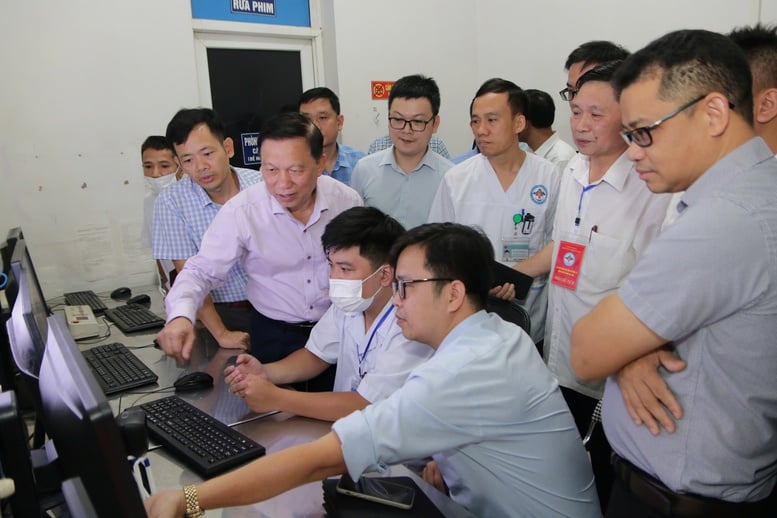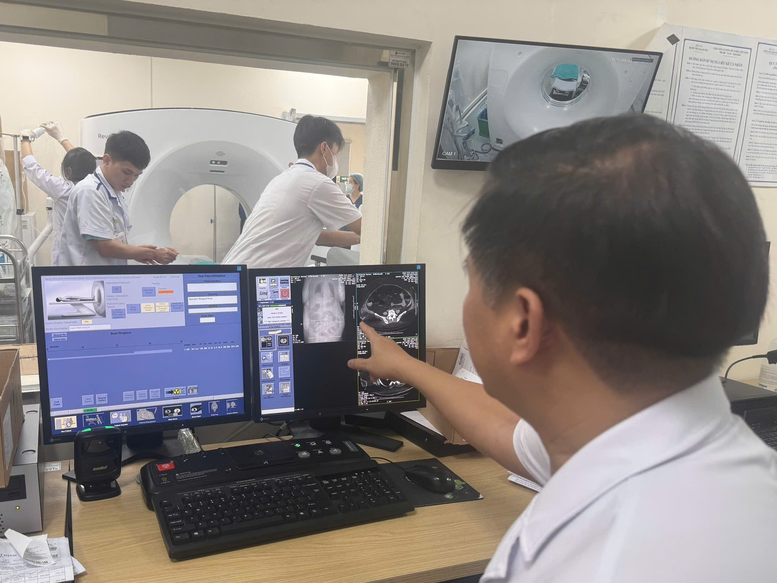
Associate Professor, Dr. Tran Quy Tuong inspects the hospital's implementation of electronic medical records at the facility - Photo: VGP
At the 4th meeting of the Government's Steering Committee on Science and Technology Development, Innovation, Digital Transformation and Project 06 held on September 24, Minister of Health Dao Hong Lan said that according to the plan, the implementation of electronic medical records will be carried out in 2025. However, due to a number of reasons, this work is delayed nationwide compared to the September 30, 2025 milestone.
Formerly Director of the Department of Information Technology, Ministry of Health , currently Chairman of the Medical Informatics Association, Associate Professor, Dr. Tran Quy Tuong is knowledgeable about the digital transformation process in the medical field.
He is also considered one of the "architects" who designed the digital transformation program for healthcare in the period 2020-2025, the Project on application and development of smart healthcare IT in the period 2019-2025 and Circular 46/2018/TT-BYT regulating electronic medical records and many legal documents on the application of healthcare IT, contributing to the implementation of electronic medical records (EMR) in Vietnam.
Associate Professor, Dr. Tran Quy Tuong had a conversation with reporters about the results of EMR implementation in the health sector. According to the Prime Minister 's direction, the Ministry of Health is responsible for directing and urging 100% of hospitals nationwide to implement Electronic Medical Records by September 2025.
Electronic medical records have many outstanding benefits.
Could you please tell us about the necessity of implementing electronic medical records instead of paper medical records in current hospitals?
Assoc. Prof. Dr. Tran Quy Tuong: In the context of the strong digital transformation of the healthcare sector, the implementation of electronic medical records to replace paper records is an inevitable and urgent requirement. Electronic medical records bring many outstanding benefits, especially for patients: no need to carry a lot of documents when going to the doctor, saving waiting time thanks to the quick processing process, medical history information, test results and diagnostic images are stored centrally, accurately and securely.
Doctors can fully grasp health status, limit duplicate testing, reduce costs and effort for patients. Electronic records also ensure continuity of care, allowing patients to access services at many medical facilities without worrying about losing information. At the same time, EMR contributes to improving safety in treatment by limiting errors in prescription and medication use and supporting doctors to make more accurate decisions.

Bach Mai is the first special-class hospital to announce the implementation of electronic medical records from November 1, 2024. Photo: VGP/HM
In particular, electronic medical records also help patients proactively monitor their health through digital applications, which is an important basis for establishing electronic health records, thereby increasing satisfaction and trust in medical services.
From a management perspective, the implementation of electronic medical records provides a large, "sufficient - clean - alive" source of data on people's health status and medical examination and treatment activities of medical facilities for the national database. This is an important basis for the health sector to carry out modern administration, policy making and improve the quality of people's health care.
In particular, our country has a basic legal framework for the implementation of EMR. However, for the application to be synchronous, sustainable and effective, the Ministry of Health needs to continue to improve the legal framework, at the same time strengthen the work of ensuring network security, information security, data safety and propaganda, training, raising awareness and capacity to apply EMR for medical staff as well as related units.
Can you tell us what are some of the core requirements of an EMR in place of paper medical records ?
Associate Professor, Dr. Tran Quy Tuong: Electronic medical records (EMR) are an important medical information system that must meet a number of core requirements. First of all, EMR must ensure the completeness, accuracy, timeliness and continuity of medical information; record the entire process of examination, diagnosis, treatment and care of the patient and, when necessary, be able to export and print paper medical records.
Second, EMR must be legal, confirmed by digital signature, electronic signature of medical staff and patients according to the provisions of law, to have the same value as paper records.
Third, the hospital must issue regulations such as regulations on the use and management of EMR, regulations on the use and management of digital signatures and electronic confirmation; regulations on ensuring information security and safety at the hospital to ensure safety and confidentiality, protect personal information and health data of patients, and ensure that only authorized persons are allowed to access.
Fourth, hospitals must comply with regulations on network security, information security and personal data protection, such as determining the level of the system, having measures to ensure the security and information safety of the system according to Decree No. 85/2016/ND-CP, Decree No. 13/2023/ND-CP of the Government on personal data protection.
Fifth, EMR must be interconnected and standardized, ensuring that data can be exchanged between systems, connected to the database of the Social Insurance agency, with different medical facilities, serving continuous medical examination and treatment, health insurance payment and health sector management.

Electronic medical records have many advantages over traditional paper medical records - Photo: VGP/HM
Just over 53% of hospitals nationwide have announced the implementation of electronic medical records.
Could you tell us how many medical facilities nationwide have implemented electronic medical records?
Associate Professor, Dr. Tran Quy Tuong : After more than 7 years since the Ministry of Health issued Circular No. 46/2018/TT-BYT regulating electronic medical records and nearly 7 months of implementing Directive No. 07/CT-TTg dated March 14, 2025 of the Prime Minister requiring 100% of hospitals nationwide to deploy electronic medical records before September 30, 2025, the implementation has achieved initial results.
According to the Ministry of Health's Electronic Information Portal, as of October 3, 991 hospitals have announced the implementation of electronic medical records. Of these, 881 hospitals, reaching 53.6% (881/1,645 hospitals nationwide) have announced the implementation of EMR before October 2, 2025 and are considered to have achieved progress according to the Prime Minister's direction.
However, 110 hospitals announced implementation after October 2, 2025 (some even as late as June 2026), which means they will not complete the project on time as required.
Among 881 hospitals that have achieved progress in implementing EMR, there are 27/45 hospitals under the Ministry of Health (including 5 University of Medicine Hospitals), reaching 60%; 329/492 provincial hospitals, reaching 66.9%; 339/684 district hospitals, reaching 49.6%; 147/384 private hospitals, reaching 38.2%; 30 military hospitals, 3 police hospitals and 6 hospitals under other ministries and branches.
Up to now, some localities have deployed EMR in all hospitals, such as the former Phu Tho province, Quang Ninh province, An Giang province, Bac Ninh province (including the former Bac Ninh and the former Bac Giang), the former Thai Nguyen province, Vinh Long province, Hanoi city, ... .
Despite many efforts, the progress of EMR implementation nationwide has not met requirements and has not completed the "finish line" goal on time as assigned by the Prime Minister.
In the coming time, the health sector needs to coordinate more closely with Party committees and local authorities at all levels, come up with drastic and specific solutions, especially for the remaining 46.4% of hospitals that must urgently deploy EMR, ensuring the completion of the goal of digital transformation of healthcare according to the Government's direction.
Through the recent widespread implementation of electronic medical records, what difficulties do hospitals encounter, in your opinion?
Associate Professor, Dr. Tran Quy Tuong : In my opinion, some of the main difficulties and challenges in applying electronic medical records in Vietnam can be summarized as follows:
Firstly, the financial mechanism is not clear. The implementation of EMR in public hospitals requires a large initial investment, while the resources of hospitals are limited. Currently, there are no specific guidelines on the financial mechanism for the application of health IT in general and the implementation of EMR in particular.
The cost of medical services has not yet taken into account the IT cost component, so hospitals mainly have to use the unit's development investment fund, affecting other essential activities.
Second, the digital infrastructure is not yet adequate. The IT platform and infrastructure of the Vietnamese healthcare sector is still weak and lacking, while this is a prerequisite for EMR implementation. This limitation causes a large total cost and requires the mobilization of many resources to be able to balance. Therefore, it is necessary to seriously consider the issue of "readiness" in EMR implementation, including policy, technical infrastructure, human resources and finance.
Third, change habits and work processes. Applying EMR is not only a change in technology, but also a comprehensive change in the hospital's discipline, habits and work processes, from traditional manual methods to scientific and strict management methods in the digital environment. This requires strong direction from hospital leaders and consensus and positive response from all medical staff.
Fourth, the attention of hospital leaders is not uniform. Some hospital directors are not really interested and do not clearly see the benefits and significance of implementing EMR, leading to a lack of initiative and determination in organizing implementation.
Fifth, the IT capacity of the medical staff is still limited. The IT level of medical staff is still lacking and weak, uneven among levels and medical examination and treatment facilities. This is a major barrier to the effective operation and exploitation of the EMR system.
Solutions to continue promoting EMR deployment nationwide
So, to promote the implementation of electronic medical records instead of paper medical records in According to the Prime Minister's Directive, what solutions do you think hospitals need in the coming time?
Associate Professor, Dr. Tran Quy Tuong : To overcome difficulties and challenges and successfully deploy electronic medical records nationwide, in my opinion, it is necessary to synchronize the following key solutions:
- It is necessary to strengthen the drastic direction of the Ministry of Health, and more closely direct the work of digital transformation of healthcare in general and the implementation of EMR in particular. Departments and agencies must proactively advise and propose policies and solutions, and simultaneously deploy specialized platforms, application systems and databases, creating motivation and "readiness" for the widespread application of EMR.
- Urgently develop, supplement and perfect mechanisms, policies, legal documents, as well as professional guidance documents to support hospitals in implementing EMR in a unified, synchronous and effective manner.
- Soon issue regulations on prices of medical examination and treatment services according to Article 110 of the Law on Medical Examination and Treatment 2023 (effective from January 1, 2024), in which information technology costs must be calculated correctly and fully. This is a key condition for medical examination and treatment facilities to have funding sources to invest, maintain and develop the EMR system.
- The Ministry of Health needs to have specific regulations and sanctions for units and localities that do not properly implement the EMR implementation roadmap. At the same time, it is necessary to promote emulation and reward work, promptly encourage localities and hospitals to do well, thereby creating a spillover effect and a reference model for learning and sharing experiences.
- Hospital directors must fully understand the benefits and significance of EMR, thereby proactively and decisively implementing it. At the same time, it is necessary to ensure proper attention in allocating financial resources, IT human resources and annual investment plans for the system to ensure maintenance and effective operation.
- Strengthen coordination between state management agencies, professional associations, technology enterprises, local authorities and teams of experts to create unity in EMR implementation nationwide, ensuring effectiveness and practicality.
- Promote training, education, and seminars to improve awareness and IT skills for medical staff. This is a key factor to ensure the effective, safe, and sustainable operation of the EMR system.
In general, the implementation of EMR is an important breakthrough in the digital transformation process of the healthcare industry, promoting the formation of smart, modern healthcare, keeping pace with the fourth industrial revolution.
EMR not only optimizes the medical examination and treatment process, improves the quality, efficiency and safety of medical services, but also significantly improves the experience of patients and medical staff.
Thank you!
Hien Minh (performed)
Source: https://baochinhphu.vn/benh-an-dien-tu-vi-sao-cham-va-lam-sao-day-nhanh-102251004155409115.htm


![[Photo] General Secretary To Lam attends the 8th Congress of the Central Public Security Party Committee](https://vphoto.vietnam.vn/thumb/1200x675/vietnam/resource/IMAGE/2025/10/4/79fadf490f674dc483794f2d955f6045)


![[Photo] Bustling Mid-Autumn Festival at the Museum of Ethnology](https://vphoto.vietnam.vn/thumb/1200x675/vietnam/resource/IMAGE/2025/10/4/da8d5927734d4ca58e3eced14bc435a3)
![[Photo] Solemn opening of the 8th Congress of the Central Public Security Party Committee, term 2025-2030](https://vphoto.vietnam.vn/thumb/1200x675/vietnam/resource/IMAGE/2025/10/4/f3b00fb779f44979809441a4dac5c7df)














































![[VIDEO] Summary of Petrovietnam's 50th Anniversary Ceremony](https://vphoto.vietnam.vn/thumb/402x226/vietnam/resource/IMAGE/2025/10/4/abe133bdb8114793a16d4fe3e5bd0f12)
![[VIDEO] GENERAL SECRETARY TO LAM AWARDS PETROVIETNAM 8 GOLDEN WORDS: "PIONEER - EXCELLENT - SUSTAINABLE - GLOBAL"](https://vphoto.vietnam.vn/thumb/402x226/vietnam/resource/IMAGE/2025/7/23/c2fdb48863e846cfa9fb8e6ea9cf44e7)






























Comment (0)